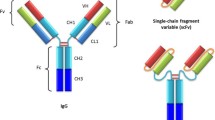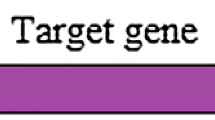Abstract
Trypanosomatids are unicellular organisms that colonize a wide diversity of environments and hosts. For instance, Trypanosoma cruzi is a human pathogen responsible for Chagas diseases, while Leishmania tarentolae infects amphibians and became a biotechnological tool suitable for recombinant protein expression. T. cruzi antigens are needed for the development of improved epitope-based methods for diagnosis and treatment of Chagas disease. Molecular cloning for the production of recombinant proteins offers the possibility to obtain T. cruzi antigens at high yield and purity. L. tarentolae appears as the ideal expression host to obtain recombinant T. cruzi antigens with a structure and posttranslational modifications typical of trypanosomatids. In this chapter, we present a protocol for the analytical to mid-scale production of recombinant T. cruzi antigens, using L. tarentolae as expression host (LEXSY® inducible system).
Access this chapter
Tax calculation will be finalised at checkout
Purchases are for personal use only
Similar content being viewed by others
References
Watanabe Costa R, da Silveira JF, Bahia D (2016) Interactions between Trypanosoma cruzi secreted proteins and host cell signaling pathways. Front Microbiol 7:388. https://doi.org/10.3389/fmicb.2016.00388
Pérez-Molina JA, Molina I (2018) Chagas disease. Lancet 391(10115):82–94. https://doi.org/10.1016/S0140-6736(17)31612-4
Balouz V, Aguero F, Buscaglia CA (2017) Chagas disease diagnostic applications: present knowledge and future steps. Adv Parasitol 97:1–45. https://doi.org/10.1016/bs.apar.2016.10.001
Thomas MC, Fernández-Villegas A, Carrilero B et al (2012) Characterization of an immunodominant antigenic epitope from Trypanosoma cruzi as a biomarker of chronic Chagas’ disease pathology. Clin Vaccine Immunol 19(2):167–173
Schnaidman BB, Yoshida N, Gorin PA et al (1986) Cross-reactive polysaccharides from Trypanosoma cruzi and fungi (especially Dactylium dendroides). J Protozool 33(2):186–191
Moure Z, Sulleiro E, Iniesta L et al (2018) The challenge of discordant serology in Chagas disease: the role of two confirmatory techniques in inconclusive cases. Acta Trop 185:144–148. https://doi.org/10.1016/j.actatropica.2018.05.010
Balouz V, Melli LJ, Volcovich R et al (2017) The Trypomastigote small surface antigen from Trypanosoma cruzi improves treatment evaluation and diagnosis in pediatric Chagas disease. J Clin Microbiol 55:3444–3453. https://doi.org/10.1128/JCM.01317-17
Jones K, Versteeg L, Damania A et al (2018) Vaccine-linked chemotherapy improves Benznidazole efficacy for acute Chagas disease. Infect Immun 86(4):e00876–e00817. https://doi.org/10.1128/IAI.00876-17
Biter AB, Weltje S, Hudspeth EM et al (2018) Characterization and stability of Trypanosoma cruzi 24-C4 (Tc24-C4), a candidate antigen for a therapeutic vaccine against Chagas disease. J Pharm Sci 107(5):1468–1473. https://doi.org/10.1016/j.xphs.2017.12.014
Cerny N, Sánchez Alberti A, Bivona AE et al (2016) Coadministration of cruzipain and GM-CSF DNAs, a new immunotherapeutic vaccine against Trypanosoma cruzi infection. Hum Vaccin Immunother 12(2):438–450. https://doi.org/10.1080/21645515.2015.1078044
Bivona AE, Sánchez Alberti A, Matos MN et al (2018) Trypanosoma cruzi 80 kDa prolyl oligopeptidase (Tc80) as a novel immunogen for Chagas disease vaccine. PLoS Negl Trop Dis 12(3):e0006384. https://doi.org/10.1371/journal.pntd.0006384
Umezawa ES, Silveira JF (1999) Serological diagnosis of Chagas disease with purified and defined Trypanosoma cruzi antigens. Mem Inst Oswaldo Cruz 94(1):285–288
Scharfstein J, Rodrigues MM, Alves CA et al (1983) Trypanosoma cruzi: description of a highly purified surface antigen defined by human antibodies. J Immunol 131(2):972–976
Berrizbeitia M, Ndao M, Bubis J et al (2006) Purified excreted-secreted antigens from Trypanosoma cruzi trypomastigotes as tools for diagnosis of Chagas’ disease. J Clin Microbiol 44(2):291–296. https://doi.org/10.1128/JCM.44.2.291-296.2006
Santos FL, Celedon PA, Zanchin NI et al (2017) Accuracy of chimeric proteins in the serological diagnosis of chronic Chagas disease – a Phase II study. PLoS Negl Trop Dis 11(3):e0005433. https://doi.org/10.1371/journal.pntd.0005433
Rosano GL, Ceccarelli EA (2014) Recombinant protein expression in Escherichia coli: advances and challenges. Front Microbiol 5:172. https://doi.org/10.3389/fmicb.2014.00172
De Marchi CR, Di Noia JM, Frasch AC et al (2011) Evaluation of a recombinant Trypanosoma cruzi mucin-like antigen for serodiagnosis of Chagas’ disease. Clin Vaccine Immunol 18(11):1850–1855. https://doi.org/10.1128/CVI.05289-11
Seid CA, Jones KM, Pollet J et al (2017) Cysteine mutagenesis improves the production without abrogating antigenicity of a recombinant protein vaccine candidate for human Chagas disease. Hum Vaccin Immunother 13(3):621–633. https://doi.org/10.1080/21645515.2016.1242540
Matos MN, Sánchez Alberti A, Morales C et al (2016) A prime-boost immunization with Tc52 N-terminal domain DNA and the recombinant protein expressed in Pichia pastoris protects against Trypanosoma cruzi infection. Vaccine 34(28):3243–3251. https://doi.org/10.1016/j.vaccine.2016.05.011
Almeida IC, Covas DT, Soussumi LM et al (1997) A highly sensitive and specific chemiluminescent enzyme-linked immunosorbent assay for diagnosis of active Trypanosoma cruzi infection. Transfusion 37(8):850–857
Lingg N, Zhang P, Song Z et al (2012) The sweet tooth of biopharmaceuticals: importance of recombinant protein glycosylation analysis. Biotechnol J 7(12):1462–1472. https://doi.org/10.1002/biot.201200078
Quanquin NM, Galaviz C, Fouts DL et al (1999) Immunization of mice with a TolA-like surface protein of Trypanosoma cruzi generates CD4(+) T-cell-dependent parasiticidal activity. Infect Immun 67(9):4603–4612
Tate CG, Haase J, Baker C et al (2003) Comparison of seven different heterologous protein expression systems for the production of the serotonin transporter. Biochim Biophys Acta 1610(1):141–153. https://doi.org/10.1016/S0005-2736(02)00719-8
Jenkins N, Murphy L, Tyther R (2008) Post-translational modifications of recombinant proteins: significance for biopharmaceuticals. Mol Biotechnol 39(2):113–118. https://doi.org/10.1007/s12033-008-9049-4
Miranda MR, Sayé M, Reigada C et al (2015) Phytomonas: a non-pathogenic trypanosomatid model for functional expression of proteins. Protein Expr Purif 114:44–47. https://doi.org/10.1016/j.pep.2015.06.019
Tetaud E, Lecuix I, Sheldrake T et al (2002) A new expression vector for Crithidia fasciculata and Leishmania. Mol Biochem Parasitol 120(2):195–204
Lee MG, Van der Ploeg LH (1997) Transcription of protein-coding genes in trypanosomes by RNA polymerase I. Annu Rev Microbiol 51:463–489
Kushnir S, Gase K, Breitling R et al (2005) Development of an inducible protein expression system based on the protozoan host Leishmania tarentolae. Protein Expr Purif 42(1):37–46
Klatt S, Konthur Z (2012) Secretory signal peptide modification for optimized antibody-fragment expression-secretion in Leishmania tarentolae. Microb Cell Fact 11:97. https://doi.org/10.1186/1475-2859-11-97
Klatt S, Rohe M, Alagesan K, Kolarich D et al (2013) Production of glycosylated soluble amyloid precursor protein alpha (sAPPalpha) in Leishmania tarentolae. J Proteome Res 12(1):396–403
Ben-Abdallah M, Bondet V, Fauchereau F et al (2011) Production of soluble, active acetyl serotonin methyl transferase in Leishmania tarentolae. Protein Expr Purif 75(1):114–118. https://doi.org/10.1016/j.pep.2010.07.011
Hemayatkar M, Mahboudi F, Majidzadeh-A K et al (2010) Increased expression of recombinant human tissue plasminogen activator in Leishmania tarentolae. Biotechnol J 5(11):1198–1206. https://doi.org/10.1002/biot.201000233
Breitling R, Klingner S, Callewaert N et al (2002) Non-pathogenic trypanosomatid protozoa as a platform for protein research and production. Protein Expr Purif 25:209–218
Puigbo P, Guzmen E, Romeu A et al (2007) OPTIMIZER: a web server for optimizing the codon usage of DNA sequences. Nucleic Acids Res 35:126–131
Vieira J, Messing J (1991) New pUC-derived cloning vectors with different selectable markers and DNA replication origins. Gene 100:189–194
Acknowledgments
This work was supported by grants to M.T.T.I. and M.P. (PIP 2015-0937 and PICT 2016-1028). M.A.C. acknowledges the financial support of FOCEM (MERCOSUR Structural Convergence Fund, [COF 03/11]).
Author information
Authors and Affiliations
Corresponding author
Editor information
Editors and Affiliations
Rights and permissions
Copyright information
© 2019 Springer Science+Business Media, LLC, part of Springer Nature
About this protocol
Cite this protocol
Ferrer, M.J., Wehrendt, D.P., Bonilla, M., Comini, M.A., Tellez-Iñón, M.T., Potenza, M. (2019). Production of Recombinant Trypanosoma cruzi Antigens in Leishmania tarentolae. In: Gómez, K., Buscaglia, C. (eds) T. cruzi Infection. Methods in Molecular Biology, vol 1955. Humana Press, New York, NY. https://doi.org/10.1007/978-1-4939-9148-8_8
Download citation
DOI: https://doi.org/10.1007/978-1-4939-9148-8_8
Published:
Publisher Name: Humana Press, New York, NY
Print ISBN: 978-1-4939-9147-1
Online ISBN: 978-1-4939-9148-8
eBook Packages: Springer Protocols




